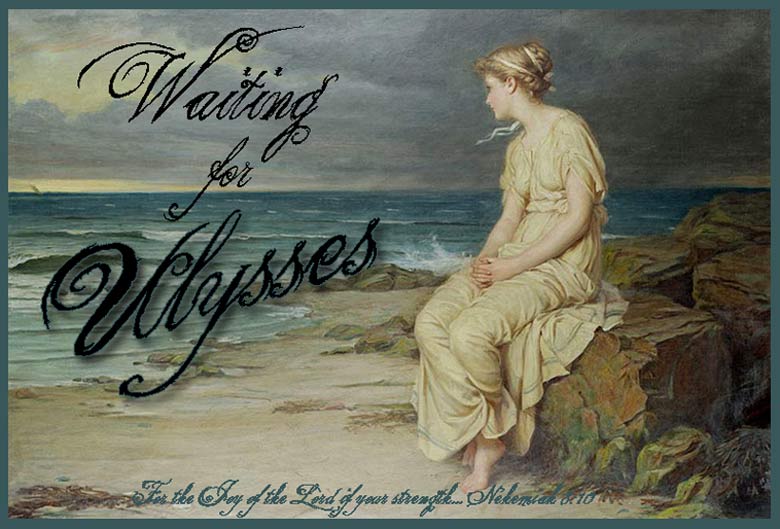Sunday, June 6, 2010
Saturday, June 5, 2010
He Wants Books!
"When you come, bring the cloak that I left with Carpus at Troas, also the books, and above all, the parchments."
~ 2 Timothy 4:13
C.H. Spurgeon:
We will look at Paul’s books. We do not know what the books were about, and we can only form some guess as to what the parchments were. Paul had a few books which were left, perhaps wrapped up in the cloak, and Timothy was to be careful to bring them.
Even an apostle must read. Some of our very ultra-Calvinistic brethren think that a minister who reads books and studies his sermon must be a very deplorable specimen of a preacher. A man who comes up into the pulpit, professes to take his text on the spot and talks any quantity of nonsense is the idol of many. If he will speak without premeditation, or pretend to do so, and never produce what they call a dish of dead men’s brains – oh, that is the preacher!
How rebuked they are by the apostle! He is inspired, and yet he wants books! He has been preaching for at least thirty years, and yet he wants books! He had seen the Lord, and yet he wants books! He had had a wider experience than most men, and yet wants books!
He had been caught up into the Third Heaven and had heard things which it was unlawful for a man to utter, yet he wants books! He had written the major part of the New Testament, and yet he wants books! The apostle says to Timothy, and so he says to every preacher, “Give attendance to reading” (1 Tim. 4:13).
The man who never reads will never be read. He who never quotes will never be quoted. He who will not use the thoughts of other men’s brains proves that he has no brains of his own.
Brethren, what is true of ministers is true of all our people. You need to read. Renounce as much as you will all light literature, but study as much as possible sound theological works, especially the Puritanic writers and expositions of the Bible.
Spurgeon's Sermons on New Testament Men, Book 2
via Trevin Wax.
Saturday, May 22, 2010
Rescued to Do Something
LOVE this (via Take Your Vitamin Z):
 152, 153
152, 153
God wants us to join him in his work of renewing peoples, places, and things. He wants Christians to renew their cultures to the honor and glory of God. God wants those he’s redeemed to work at transforming this broken world and all its broken structures—families, churches, governments, businesses—in a way that reflects an answer to the Lord’s Prayer: “Your kingdom come, your will be done, on earth as it is in heaven” (Matt. 6:10). We’re to fill every aspect of the earth with the knowledge of God, our creator and redeemer. We’ve been redeemed by God to become agents of renewal.
In redeeming us, God doesn’t simply rescue us from our sin; he also rescues us to do something—to develop the world around us to the glory of God. Therefore, when God saves us, we no longer have to settle for creating our own transitory meaning. How many of us spend our lives manufacturing our own reasons to live? Maybe it’s raising our kids well so they’ll turn out okay, and if they do, we’ll think our life was worthwhile. There’s so much talk about the need to leave a legacy. I’m not entirely sure what that means, but I don’t like it. My life is not about leaving a legacy that makes people remember Tullian Tchividjian. God’s mission for me and for all of us is so much bigger than that, which is liberating, because it means we don’t have to try to manufacture our own passing legacy.
When God saves us, he gives us a new reason to live that’s so much more significant than our fleeting legacies. We become part of an infinitely larger story than our personal history, larger even than the story of our family and nation. We no longer have to work for our own causes; instead we get to work for God’s universal cause. That’s a mission worth getting on board with!
God’s mission and the direction it’s going are so much bigger than our misconceptions. His mission is the one thing we can give our life to that will never be lacking in fulfillment and will never end.~Tullian Tchividjian, Surprised by Grace: God's Relentless Pursuit of Rebels
The Gospel cannot be preached and heard enough
“The gospel cannot be preached and heard enough, for it cannot be grasped well enough..."
Martin Luther
(via Justin Taylor via Sovereign Grace Ministries)
C.J. Mahaney recommends some books that preach the gospel here.
Martin Luther
(via Justin Taylor via Sovereign Grace Ministries)
C.J. Mahaney recommends some books that preach the gospel here.
Labels:
C.J. Mahaney,
Gospel,
Justin Taylor,
Martin Luther
Friday, May 21, 2010
On Finding Your Calling
I enjoy subscribing to the Resurgence blog ("The Resurgence is a reformed, complementarian, missional movement that trains missional leaders to serve the Church to transform cultures for Christ."), and in particular, I like Mark Driscoll's entries on that blog.
I was particularly struck by the recent one entitled, Train the Called-- Do Not call the Trained. In it, he focuses on finding your calling. He writes:
I really do recommend reading the whole post, but that last part is what resonated with me. What are the desires of my heart?
A few years ago, while living in New York City, I was encouraged by a dear friend to begin a women's Bible study with some of my girlfriends. I began with a lot trepidation-- fears about whether I was qualified to lead other women in the study of the Bible, about whether the girls would even want to be a part of something like that, and questions about what the heck we'd even talk about. I jumped in head first, and God immediately blessed me and the others in that undertaking. I learned that I loved theology, and enjoyed teaching others, and what's more, I saw real growth among all of us during that time. On a recent trip to New York, I met with some of women, and was delighted to hear that they're still meeting together-- seven years later! There are new faces now, and some of the women have gone on to start other studies with other women. What a blessing that is!
When I picture the future, a frequent vision I have is a home where I can have people over. I'd love to have a guest room that is always available to travelers in need. More than that though, I picture a weekly open house. I'd love to cook meals and let everyone know that every Tuesday night is family meal night. Anyone who wants to drop in can, and after dinner we'll talk theology-- maybe going through a book of Systematic Theology together. I picture a mixed crowd, so while I'd be happy to facilitate the discussion, I picture my husband (I don't have one yet-- that's also in the vision!), or another Christian male taking the honors. This is the desire of my heart.
And while I don't have the home yet to make that dream reality, I can certainly get involved with small groups in my church. I can prayerfully seek out younger (in the faith) Christian women and meet with them.
What desires has God planted in your heart?
I was particularly struck by the recent one entitled, Train the Called-- Do Not call the Trained. In it, he focuses on finding your calling. He writes:
So I was talking to a new Christian recently and they were unsure about God's calling on their life. "I don't know what God wants me to do. Got all these new decisions to make in life now that I'm a new Christian." And they were very kind of panicked about it, "What do I do?" I said, "Don't worry about God's calling, first worry about God. The Bible says, 'Delight yourself in the Lord, and he'll give you the desires of your heart.'" I said, "Are you enjoying the Lord?" They said, "Yeah, I'm reading my Bible. I'm praying. I'm in a community group and reading good books, and I'm repenting of sin, and I'm seeing the ways that I'm not like Jesus, and my life is changing and yeah, I feel like there's momentum, and I'm really excited about Jesus, and I'm growing." "Great."
This person looked at me and said, "Well, what do I do?" I said, "Do whatever you want." They're like, "What? Do whatever I want?" "Yeah, because if you delight yourself in the Lord, he'll give you the desires of your heart. He'll put desires on your heart, so that God's desires become your desires." Augustine said it this way, "Love God and do whatever you please." I said, "Well, what do you like?" They're like, "Well, I like serving people, and I'm pretty extroverted and, you know, I like welcoming people." "So you want to be a greeter?" "Yeah, I'd love to be a greeter. And I love hospitality and I love getting people together." "So someday you'd like to be a community group leader?" "That'd be great. I'm not ready yet, but maybe I could apprentice and get ready." "Yeah, that'd be a great idea. How does that sound?" "That sounds really fun. Should I do it?" "Do you want to?" "Yeah, well, how do I know if it's God will or my will?" "Well, if you're enjoying the Lord, his will becomes your will. He's glorified, you're satisfied, other people are helped. Everybody wins, that's ministry." It's more about our heart enjoying the Lord, and then we'll want to do what he wants us do.
I really do recommend reading the whole post, but that last part is what resonated with me. What are the desires of my heart?
A few years ago, while living in New York City, I was encouraged by a dear friend to begin a women's Bible study with some of my girlfriends. I began with a lot trepidation-- fears about whether I was qualified to lead other women in the study of the Bible, about whether the girls would even want to be a part of something like that, and questions about what the heck we'd even talk about. I jumped in head first, and God immediately blessed me and the others in that undertaking. I learned that I loved theology, and enjoyed teaching others, and what's more, I saw real growth among all of us during that time. On a recent trip to New York, I met with some of women, and was delighted to hear that they're still meeting together-- seven years later! There are new faces now, and some of the women have gone on to start other studies with other women. What a blessing that is!
When I picture the future, a frequent vision I have is a home where I can have people over. I'd love to have a guest room that is always available to travelers in need. More than that though, I picture a weekly open house. I'd love to cook meals and let everyone know that every Tuesday night is family meal night. Anyone who wants to drop in can, and after dinner we'll talk theology-- maybe going through a book of Systematic Theology together. I picture a mixed crowd, so while I'd be happy to facilitate the discussion, I picture my husband (I don't have one yet-- that's also in the vision!), or another Christian male taking the honors. This is the desire of my heart.
And while I don't have the home yet to make that dream reality, I can certainly get involved with small groups in my church. I can prayerfully seek out younger (in the faith) Christian women and meet with them.
What desires has God planted in your heart?
Saturday, May 15, 2010
Turning From Sin
via DeYoung, Restless, and Reformed:
“[I]t is certainly empirically true in history,” writes Richard Lovelace in Dynamics of Spiritual Life, “that a failure to assert the Trinity and the sacrificial death of Christ has involved a waning of spiritual life in the church, and eventually its extinction” (97). Lovelace goes on to elaborate:
Any denominational or ecclesiastical renewal that is not centered on the gospel of Christ’s sacrificial death for sin is bound to be shallow, short-lived, and, in the end, counterproductive.
“[I]t is certainly empirically true in history,” writes Richard Lovelace in Dynamics of Spiritual Life, “that a failure to assert the Trinity and the sacrificial death of Christ has involved a waning of spiritual life in the church, and eventually its extinction” (97). Lovelace goes on to elaborate:
The substitutionary atonement is the heart of the gospel, and it is so because it gives the answer to the problem of guilt, bondage and alienation from God. The earlier this answer can be spelled out in the process of evangelism and nurture, the better. Persons come to Christ initially for a variety of reasons, some of which are eccentric to their principal need for redemption: loneliness, a sense of meaninglessness in the godless life, suffering, fear and so on. Only those are lastingly converted, however, whose eventual motivation is to turn from their sin to God and receive the answer to sin in the work of Jesus Christ: “For everyone who does evil hates the light, and does not come to the light, lest his deeds should be exposed. But he who does what is true comes to the light, that it may be clearly seen that his deeds have been wrought in God.” (Jn. 3:20-21). Spiritual life results from fellowship with God. But walking in light is essential to fellowship with the Father and the Son. Believers who are truly established in Christ have experienced the shattering of their spheres of of ignorance and darkness by a growing understanding of the nature of God, their sin and God’s provision of grace in Jesus Christ. This darkness can only be destroyed by the presentation of the preconditions of renewal and by the proclamation of the heart of the gospel in depth. (97-98)
Any denominational or ecclesiastical renewal that is not centered on the gospel of Christ’s sacrificial death for sin is bound to be shallow, short-lived, and, in the end, counterproductive.
Labels:
Genuine Conversion,
Kevin DeYoung,
Richard Lovelace,
Sin
Wednesday, May 5, 2010
Death, thou shalt die!

C.S. Lewis, The Screwtape Letters* (via The Inklings):
The first thing he did was to lower himself and be born as one of "them." We almost got him killed when he was a baby. But he eluded us then. He grew up to be a man. He taught those poor humans about himself, all the while not really spreading around who he was. Then one day he gave himself up to be killed by a bunch of jealous religious leaders. We figured it was a big bluff. Just an excuse to perform a public miracle and escape at the last minute. But he actually went through with it. He let them nail him to a cross and he died. We all thought, "Aha, you're beaten now! You've just made your big mistake!"
All of us were feeling, for a few hours, a big relief from that constant fear we had always felt toward the Enemy. Maybe all those prophecies about our last judgement would never happen after all. Death had claimed the Creator of life. Finally our Lord Satan would be undisputed ruler of all.
Then Sunday morning came. The Enemy reappeared. Suddenly, he was alive. Death could not hold him. But it was even worse than that. He had become an innocent sacrifice for the sins of all those humans. He had paid their penalty. He had died in their place. Now death could not hold them either. They could be forgiven and reunited with the Enemy. They can now live forever. For all practical purposes, death has died. There has never been a more disastrous day in the history of the universe.
That, my dear Wormwood, is the whole sad truth.
*The Screwtape Letters is a book by C.S. Lewis, published in 1942. The story consists of a series of letters written by a senior demon, Screwtape, to his demon nephew Wormwood on how best to secure a man's damnation. Notably, the senior demon prefers encouraging his targets to gradually slip into sin and perversity ("the safest path to hell is the gradual one.") rather than encouraging them to indulge in extravagant and more notable sins.
Labels:
C.S. Lewis,
Screwtape,
The Screwtape Letters,
Wormwood
Friday, April 9, 2010
The Fellowship of Christian Brethren
I just read these words over at Take Your Vitamin Z. The quote is from Dietrich Bonhoeffer, the German pastor who was executed 65 years ago today at a concentration camp.
I certainly take my Christian fellowship for granted, and yet I am surrounded by the most extraordinary Christian friends. I am so thankful for all of you who love me, encourage and pray for me, and for those who hold me accountable. I am thankful that God has placed each of you in my life for a reason, and I pray that I never forget that I am truly blessed to be in such a company of believers.
It is easily forgotten that the fellowship of Christian brethren is a gift of grace, a gift of the Kingdom of God that any day may be taken from us, that the time that still separates us from utter loneliness may be brief indeed. Therefore let him who until now has had the privilege of living a common Christian life with other Christians praise God's grace from the bottom of his heart. Let him thank God on his knees and declare: It is grace, nothing but grace, that we are allowed to live in community with other Christian brethren (Life Together, p. 20).
I certainly take my Christian fellowship for granted, and yet I am surrounded by the most extraordinary Christian friends. I am so thankful for all of you who love me, encourage and pray for me, and for those who hold me accountable. I am thankful that God has placed each of you in my life for a reason, and I pray that I never forget that I am truly blessed to be in such a company of believers.
Labels:
believers,
blessing,
brethren,
Christians,
Dietrich Bonhoeffer,
fellowship,
friends,
grace,
Life Together,
thankful
Thursday, April 1, 2010
I.Love.These
Designed by my supremely talented friends, Charl and Donna.
If you're in Cape Town, VOX City Church is a new church community starting up in the City Bowl of Cape Town. You can visit their website here for more information.
Please note: Friday's service has changed locations to Baran's Restaurant in Green Market Square.
Labels:
Cape Town,
City Church,
Easter,
Good Friday,
Sunday,
VOX
Monday, March 22, 2010
What James Cameron Got Wrong
I had the pleasure of hearing D.A. Carson speak at my church in Dubai back in October. In one of his illustrations he contrasts the sinking of the Titanic and the men onboard who sacrificially gave their lives for the women and children with the depiction that is portrayed in Hollywood version of the movie. What he finds is a "damning indictment of the development of western culture, especially Anglo-Saxon culture in the last century."
A while back, I tried to find the story online to repost, but wasn't able to. Thankfully, Carson now has a book which is, I believe, a collection of excerpts from his talks. And, Kevin DeYoung has posted that exact anecdote on his blog:
A while back, I tried to find the story online to repost, but wasn't able to. Thankfully, Carson now has a book which is, I believe, a collection of excerpts from his talks. And, Kevin DeYoung has posted that exact anecdote on his blog:
Perhaps part of our slowness to come to grips with this truth lies in the way the notion of moral imperative has dissipated in much recent Western thought. Did you see the film Titanic that was screened about a dozen years ago? The great ship is full of the richest people in the world, and , according to the film, as the ship sinks, the rich men start to scramble for the few an inadequate lifeboats, shoving aside the women and children in their desperate desire to live. British sailors draw handguns and fire into the air, crying “Stand back! Stand back! Women and children first!” In reality, of course, nothing like that happened. The universal testimony of the witnesses who survived the disaster is that the men hung back and urged the women and children into the lifeboats. John Jacob Astor was there, at the time the richest man on earth, the Bill Gates of 1912. He dragged his wife to a boat, shoved her on, and stepped back. Someone urged him to get in, too. He refused: the boats are too few, and must be for the women and children first. He stepped back, and drowned. The philanthropist Benjamin Guggenheim was present. He was traveling with his mistress, but when he perceived that it was unlikely he would survive, he told one of his servants, “Tell my wife that Benjamin Guggenheim knows his duty” –and he hung back, and drowned. There is not a single report of some rich man displacing women and children in the mad rush for survival.When the film was reviewed in the New York Times, the reviewer asked why the producer and director of the film had distorted history so flagrantly in this regard. The scene as they depicted it was implausible from the beginning. British sailors drawing handguns? Most British police officers do not carry handguns; British sailors certainly do not. So why this willful distortion of history? And then the reviewer answered his own question: if the producer and director had told the truth, he said, no one would have believed them.I have seldom read a more damning indictment of the development of Western culture, especially Anglo-Saxon culture, in the last century. One hundred years ago, there remained in our culture enough residue of the Christian virtue of self-sacrifice for the sake of others, of the moral imperative that seeks the other’s good at personal expense, that Christians and non-Christians alike thought it noble, if unremarkable, to choose death for the sake of others. A mere century later, such a course is judged so unbelievable that the history has to be distorted (30-31).
Labels:
DA Carson,
James Cameron,
Kevin DeYoung,
self-sacrifice,
Titanic
Thursday, March 4, 2010
An Audience with the King
An inspiring anecdote from the 1800s that I found on my friend Corrie's blog:
A number of years ago I went to America with a steamship captain who was a very devoted Christian. When we were off the coast of Newfoundland, he said to me, “The last time I sailed here, which was five weeks ago, something happened that revolutionized my entire Christian life. I had been on the bridge for 24 straight hours when George Mueller of Bristol, England, who was a passenger on board, came to me and said, Captain, I need to tell you that I must be in Quebec on Saturday afternoon. ‘That is impossible’, I replied. ‘Very well’, Mueller responded, ‘if your ship cannot take me, God will find some other way, for I have never missed an engagement in 57 years. Let’s go down to the chartroom to pray’. “I looked at this man of God and thought to myself, ‘What lunatic asylum did he escape from?’ I had never encountered someone like this. ‘Mr. Mueller’, I said, ‘do you realize how dense the fog is?’ ‘No’, he replied. ‘My eye is not on the dense fog but on the living God, who controls every circumstance of my life’. “He then knelt down and prayed one of the most simple prayers I’ve ever heard. When he had finished, I started to pray, but he put his hand on my shoulder and told me not to pray. He said, ‘First, you do not believe God will answer, and second, I believe He HAS. Consequently, there is no need whatsoever for you to pray about it.’ “As I looked at him, he said, ‘Captain, I have known my Lord for 57 years, and there has never been even a single day that I have failed to get an audience with the King. Get up Captain, and open the door, and you will see that the fog is gone.’ I got up, and indeed the fog was gone. And on Saturday afternoon, George Mueller was in Quebeck for his meeting.”
In case you don't know, George Mueller was a great prayer warrior of the 19th century. After becoming a Christian, he felt called to help the orphans in Bristol, England. He built several orphanages, and during his life time helped 10,000 orphans. The most amazing thing is that he raised the money for the housing and care of the orphans solely through prayer. He resolved to never ask anyone for money so that that God would receive the sole praise as their needs were met.
Labels:
audience with the King,
George Mueller,
George Muller,
prayer
Monday, March 1, 2010
Where Has Christianity Gone
J.D. Greear just finished reading a book by Mark Noll called The New Shape of World Christianity. He shares some interesting and thought-provoking statistics that he gleaned from the book:
In 1900 over 80% of the world Christian population was Caucasian and over 70% resided in Europe; today, 2009 (when he wrote the book) there are more practicing Christians in Africa than in all European countries combined.
On any given Sunday, more Christians attend church in Kenya than in Canada, and more believers worship together in Nagaland than in Norway.
Uganda has more Anglicans than Britain, Canada and the United States combined. The same is true for Kenya, Tanzania, and Nigeria.
This past Sunday there were more Presbyterians in church in Ghana than in Scotland.
In 1970 there were no legally functioning churches in all of China. But it is estimated that today the number of practicing Christians in China is equal to the number in the United States.
The largest church in Korea has more people present for a single worship service than are at Canada’s ten largest churches combined.
Brazil now sends more overseas missionaries than does Britain or Canada.
The looming explosion of Christians is in the Muslim world, where 2/3 of all the unreached peoples now live.
Christianity is not a Western thing; it never has been a Western thing. I love how Bob Roberts says it: “Christianity began as a Jewish movement to God; it will conclude as a Muslim movement to Jesus.” The Gospel is for all peoples of all times in all places in the world.
Labels:
Christians,
church,
J.D. Greear,
Mark Noll,
Where Has Christianity Gone
Monday, February 22, 2010
A Different Kind of Woman
We are called to be women. The fact that I am a woman does not make me a different kind of Christian, but the fact that I am a Christian makes me a different kind of woman. For I have accepted God's idea of me, and my whole life is an offering back to Him of all that I am and all that He wants me to be.
Elisabeth Elliot, Let Me Be a Woman, pg. 43
Thursday, January 14, 2010
When People are Big and God is Small
My friend at my church in Dubai gave me this book to read-- he said he has a lot to read these days, and wants to know if it is a worthwhile read. I think he just gave it to me because he thinks it is a book I could use.
The book is called, When People are Big, and God is Small, and is by Edward T. Welch. The subtitle is Overcoming Peer Pressure, Codependency, and the Fear of Man.
Who doesn't struggle with this stuff? Whatever the reason for giving me the book, I am thankful to have it, and I am hoping it will help me face some of my "fear of man" issues. As I was reading yesterday, this struck me:
Sometimes we would prefer to die for Jesus than to live for him. If someone had the power to kill us for our profession of faith, I imagine most Christians would say, "Yes, I am a believer in Jesus Christ," even if it meant death. The threat of torture might make people think twice, but I think most Christians would acknowledge Christ. However, if making a decision for Jesus means that we might spend years being unpopular, ignored, poor, or criticized, then there are masses of Christians who temporarily put their faith on the shelf. "Death is not imminent, so why hurry into a rash decision?" "There will be time later to get things straight with God."
In other words, kill me, but don't keep me from being liked, appreciated, or respected.
It gets you thinking, doesn't it?
Subscribe to:
Posts (Atom)








